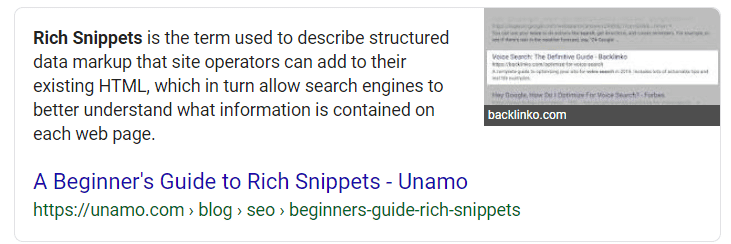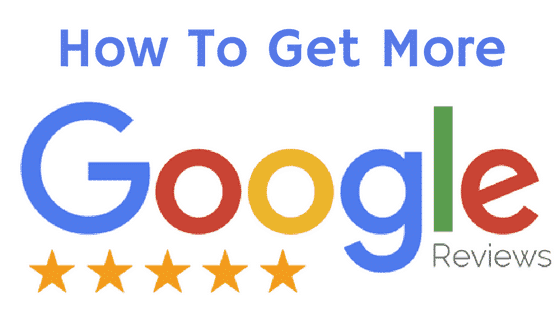
How to get your website on Google
On Google, you’re either on the first page, or you’re invisible. When Backlinko analyzed 5 million search results, they found that the #1 result in Google’s organic search results has an average click-through rate (CTR) of 31.7%. And the #1 spot is ten times more likely to be clicked than the result in the #10 spot. But what happens if your website isn’t on the first page? Not much. Less than 1% of users click a result on page two of the SERPs (search engine result pages).
Earning one of the top spots could lead to your content being featured in a rich snippet for that topic, which is a callout box with information. It’s a great way to increase your exposure and credibility.
Grabbing the top spot, or even the front page on Google search is not easy. There’s a lot of competition and everyone wants the same spot. How can a small business compete?
How do search engines work?
Need a Professional Website For Your Business?
First, let’s understand what Google wants. Dating back to the early days, Google has always made its intent clear: They seek to deliver the best, most complete answer available on the web to each query typed into the search box.
The search engines have small programs, nicknamed spiders or Google bots, that constantly crawl the web to add pages to the search index. Your pages are examined and evaluated. Your ranking – where your website lands on the search results – is determined by weighing 200 ranking factors.
To dominate the Google search results, you need to deliver the high-quality content they are looking for. But that’s only the beginning. Each of the tips we discuss below covers an important ranking factor.

How to get your local business to rank on Google
- Your site is the foundation to rankings
- Add your business to Google
- Submit your business to local directories
- Optimize pages for main keywords
- Get happy customers to leave reviews
You don’t have to be an SEO (search engine optimization) expert or a programmer to get your site on the first page of Google. Where you land, however, depends on how well your competition uses the same techniques. Competition always changes the game, and yours will fight to outrank you. The key to staying on top is to keep changing things up by adding new value to your site.
Your site is the foundation to rankings
It doesn’t matter whether you’re a neighborhood dog groomer, a food truck, or a small chain of yogurt shops, even small businesses need a website to generate business and grow. It’s less expensive than you might think, and more beneficial than you probably imagine. To rank well, your website needs to be well organized, fast loading, and accessible to web crawlers.
Make Ssre your pages are crawlable
In order to add your page to Google’s index, Google bots and other web crawlers need permission. To find out if your site is accessible by Google crawlers, use the “URL Inspection” feature in the Google Search Console. If search engines are prevented from accessing your page (most commonly in a file called Robots.txt), it will not show up in the search at all. Blocking web crawlers is useful for internal pages you want to keep private, such as employee information pages that require a login for access, but an inexperienced webmaster might accidentally copy this file to a public page. If your page doesn’t show up in the search even when using your brand name, that’s the first place to check.
Site load speed
One common rookie mistake is loading up pages with programs and graphics that slow loading times down. Today’s users simply won’t wait. If your web page loads slow, they will click away. Make your pages lean by reducing image sizes and avoiding programs that slow loading, like outside ads, music, and popups on load.
Mobile optimization
This isn’t exactly a DIY tip, but it’s important. Google places great importance on how well your website displays on mobile devices. Because so many searches are done on mobile devices, you’re unlikely to earn a high ranking without a mobile-friendly website. If you’re using a professionally designed website, mobile optimization should be included. Not sure? Check your site with the Google Mobile-Friendly Test.
Broadly resource:
Submit your business to local directories
Online local business directories, also called citation sites, help your business build credibility and trust. As a small business owner, you need to do two things: claim any existing listings and submit your site to relevant listing sites.
To decide which sites are relevant to your industry, you can consult this list compiled by Moz.
Once your business is featured on local business directories, it’s important to keep listings up to date, monitor for errors, and answer any comments or reviews left (where applicable).
On-page optimization for SEO
Your meta tags make a big difference to search engine optimization, and it’s a fast, easy fix. In the header of your page HTML or website creator, you’ll find fields or codes that identify the title, description, and URL. Here’s what you need to know:
Title tag
- It should be 50 to 60 characters long, including the business name.
- Use the primary keyword for the page.
- Don’t use the same title for other pages.
Meta description
- A short summary of the page content
- Include primary keyword
- Make it no longer than 160 characters
Page URL (website address)
- Include your primary keyword.
- Make the title 2 to 7 words long.
- Use hyphens, not underscores.
- Don’t use special characters.
Example: For our blog page “How to Get More Google Reviews For Your Business:
- The title tag is “How To Get More Google Reviews For Your Business – Broadly.com”
- The description is “Don’t know how to get Google reviews for your business? Not to worry, the team at Broadly walks you step by step on how to get Google reviews for your company.”
- The URL is: broadly.com/blog/how-to-get-google-reviews/
Create helpful content
Many of the top-ranking factors on Google are related to your content is relevant and helpful. Having a blog that answers your customers’ main questions will help you to rank for those questions. As you provide value to the reader they are more likely to work with you in the future.
- Content uniqueness – Even though your content might be a topic covered on other websites, you need to bring fresh insight, better organization, or new information to the table. If you’re a roofing business, for example, “How we repair your roof” may not change much over the years, but you can add information about brand new materials, meeting legal standards, and new techniques to make it topical, interesting, and unique.
- Keyword usage – Keywords still count. Ten years ago, websites stuffed keywords into articles by repeating the same phrases over and over so often the articles made little sense. That will actively hurt your ranking today. Instead, write in a natural voice and include related subjects and keywords. Keyword tools:
- Clearscope – gives you keywords and analyzes your content to see how well you did.
- Google Keyword Planner – easy for a beginner to use and understand.
- Soovle – collects keywords from different search engines.
- Jaaxy – in addition to delivering keywords, Jaaxy tracks site rank and helps you find keyword domain names.
- Search intent match – This one is pretty easy. Some people use headlines and descriptions that promise one thing to get clicks, but don’t deliver on that promise. The headline and description must describe what readers will find on the page, or they will scan and click away in seconds. If enough people do that, it’s a signal to the Google RankBrain that your content isn’t what users are really searching for, and it will hurt your rank. If your page title is “10 Brand New Hairstyles for 2019” and your description reads “The newest, trendiest hairstyles in salons today” but your page is about hairstyles popular 5 or 10 years ago, people will leave your page immediately.
- Content freshness – Evergreen content is content that remains useful for years, and it’s a great way to fill your site and build a complete knowledge base for your customers. However, you do want to review and update your evergreen content every year to be sure links and references are still valid, and to add new information when you can.
- E-A-T expertise, authoritativeness, and trustworthiness – This one is a little tricky. RankBrain makes every effort to determine whether the person who wrote the content is an expert in the subject, but you can be considered an expert by posting a great deal on the same subject, by working in the industry, and by offering knowledge and insight.
- Rich content: Photos, graphics, and videos – To attract the organic traffic you need in order to boost rank, make your pages interesting with graphics, photos, and videos. Google image search is increasingly important, and you can add value by optimizing image URLs. You may even want to allow sharing of unique images with credit – this creates backlinks to your content, another way to boost your search engine ranking.
- Internal links – when writing your content, include internal links to other pages in your site to help people learn more about a specific topic that’s part of a larger or related subject. This helps people understand and keeps them on your site longer.
Get customer reviews
Traffic is an important signal used in web page ranking. One of the most reliable ways to build trust, authority, and to generate more organic traffic is through personal reviews. 90% of consumers say they check reviews before buying, and 63% use a search engine to find reviews. To get reviews on Google
- Ask for reviews and make leaving then easy. Broadly’s Automated Review Platform helps you build reviews fast.
- Put links to Google reviews on your webpage and send to customers when you ask for reviews.
- Provide info on how to leave reviews.
- Respond to every Google review.
- Know how to remove Google reviews, or fix and flag inappropriate Google reviews (in case of a malicious attack or inappropriate language).
- Be prepared for negative Google reviews.
- Set up template messages to ask for reviews.
Most happy customers are happy to leave reviews when asked to do so. The easier you make it for them, the more likely they are to take action.
What about paid ads?
While paid ads show up above organic ads, more people ignore them. Research by Smart Insights shows that 94% of clicks go to natural listings. Paid ads can help get you noticed in the short term, but once the budget runs out your business disappears from the search results.
My site is live. What’s next?
Once you launch your website it could take a few days before your site is in Google’s index, and longer than that before Google trusts it to rank well for your main terms. You can jumpstart the process by promoting your new website on social media, engage new visitors through text messaging and email, the request customers to review your site.
Transform your local business with revolutionary AI-powered software



